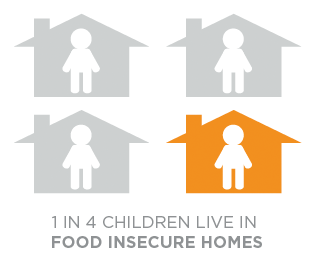Food Insecurity
 Food Insecurity is the state of being without reliable access to a sufficient quantity of affordable, nutritious food on a regular basis.
Food Insecurity is the state of being without reliable access to a sufficient quantity of affordable, nutritious food on a regular basis.
According to Feeding America, 42.2 million Americans lived in food insecure households, including 29.1 million adults and 13.1 million children. Children and adults face hunger in every community across the country. Your neighbor, child’s classmate or even coworker may be struggling to get enough eat.

Child Hunger
In the United States, one of the wealthiest nations in the world, 1 in 7 people struggles with food insecurity. Households with higher rates of food insecurity are those with children, especially households headed by single parents. In fact, 1 in 4 children in America is hungry. For some children, the only meal they get during the day is through free lunch programs at school.
Good nutrition, particularly in the first three years of life, is important for establishing a good foundation that has implications for a child’s future physical and mental health, academic achievement, and economic productivity. Unfortunately, food insecurity is an obstacle that threatens that critical foundation. The fact that some many of our nation's youth struggle with food insecurity is not only detrimental to their health and well-being, but effects the overall health and strength of our economy and our nation's future as well.
How Food Banks Help
Food banks work to connect people with food and end hunger. They secure donations from food and grocery manufacturers, retailers, shippers, packers and growers and from government agencies and other organizations. Larger agencies, like Oregon Food Bank, are affiliates for Feeding America and have the infrastructure to distribute donated food and grocery products to food pantries and meal programs that serve families, children, seniors and others at risk of hunger. Last year alone, the Feeding America network distributed more than 4 billion meals to people in need.
Food banks also support programs that improve food security among the people they serve; educate the public about the problem of hunger; and advocate for legislation that protects people from going hungry. Individuals, charities, businesses and government all have a role in ending hunger.
Together, we can make a difference to help families in need.